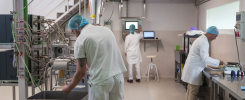Ctic Cita and Cárnicas Avícolas Calatayud participate in a joint research project to find new sources of protein with immunomodulatory activity.
Aiming to research and develop new protein sources as an alternative to the traditional meat, fish and other animal-based sources, Ctic Cita and Calatayud will be working on the PROTECTION project over the next four years.
The project implements a completely innovative methodology in the agri-food sector, the novelty of which is to be able to predict the efficacy of an ingredient or functional food at a much earlier stage. To assess nutritional and bioactive potentials, high-performance in vitro and ex vitro biological models will be used to collect data and, through data analytics and AI, generate correlation patterns between the characterisation of an ingredient or functional food and its efficacy in order to generate prediction models.
Ctic Cita and Calatayud in the development of new products from alternative protein sources
Calatayud, together with Ctic Cita, will investigate the application of new protein sources for use in the development of chicken meat analogues. In addition, it will study the suitability of different bioactive ingredients in these formulations to give the products immunomodulatory activity: that is, products with the capacity to exert a pharmacological effect on the immune system for the prevention and treatment of diseases and pathologies.
Ctic Cita will advise Calatayud on the experimental design for the formulation and development of new products based on two alternative protein sources: plant and fungal. For their processing, he will use state-of-the-art technologies in protein texturisation such as extrusion, and will also study the effect of this technology on the bioavailability of the ingredients. In addition, the selected matrices will be nutritionally and sensorially analysed and a final characterisation of the prototypes developed will be carried out.
A tool for the prediction of bioefficiency
The PROTECTION project will have a second part in which all the data obtained after the evaluation of the digestibility, bioaccessibility, bioactivity and technological characterisation of the new protein sources, as well as their immunomodulatory action, will be used to generate Predictive Models of Food Bioefficiency or MPBA.
Finally, MPBAs will be verified and extrapolated to metabolic pathologies with associated immune alterations, as well as to the creation of isolated bioactive ingredients to achieve the extrapolation of the use of MPBAs to the food sector as a whole.
A multidisciplinary scope through public-private collaboration
The project involves the participation of seven companies (Laboratorios ORDESA, ADM-Biopolis, Industrias Lácteas Asturianas, Lagumar, Mealfood Europe, Viscofan España, and Matadero José Calatayud e Hijos), four agri-food research centres (Ctic Cita, EURECAT, AINIA and CIAL-CSIC); four universities (University of Granada, University of Oviedo, Rovira i Virgili University and University of Navarra); and three hospital research centres (Fundación para la Investigación Biosanitaria de Andalucía Oriental – Alejandro Otero (FIBAO), Instituto de Investigación Sanitaria de Aragón (ISS Aragón) and Fundación Instituto de Investigación Sanitaria de Santiago de Compostela (IDIS).
The research is be funded under the CIEN call of the Spanish Centre for the Development of Industrial Technology – CDTI, with a budget of over 7 million euros.



